
The Yen Tu Spring Festival will open on February 25 (the 10th day of the Lunar New Year), in Uong Bi city, the northern province of Quang Ninh, kicking off the National Tourism Year hosted by the locality.

Dong pagoda
located on the peak of Yen Tu mountains (Source: VNA)
Key events held within the festival include the opening ceremony, Cherry
Blossom and Yen Tu yellow apricot blossom festival and Hang Son Pagoda Festival.
This year, Uong Bi city will work to ensure social order and traffic safety and
prevent fire and explosion. Kiosks will be arranged to introduce tourism
products and services to visitors.
In preparation for the festival, investments have been made in infrastructure
in the Yen Tu spiritual tourism site, including the upgrade of the road to Yen
Tu relic site and the construction of a new cable car system to prevent traffic
congestion.
The province is also working to complete the first phase of the Yen Tu festival
tourism services centre, which features Truc Lam palace, a Zen village, a
pilgrimage village and the King monk Tran Nhan Tong museum.
Last year, Yen Tu relic site attracted more than 2 million visitors, including
250,000 foreigners, up 200 percent against 2016’s figure.
Yen Tu Mountain is located about 50 kilometres from Ha Long City. The area has
awe-inspiring scenery, surrounded by ancient pagodas and hermitages.
Tran Nhan Tong (1258-1308), the third King of the Tran dynasty, ascended to the
throne when he was just 21. He is famed for defeating Mongol invaders twice
during his 15-year reign.
The King abdicated when he was 35 and spent the rest of his life on Yen Tu
Mountain practicing and propagating Buddhism. He founded the first Vietnamese School
of Buddhism called "Thien Tong” or Truc Lam Yen Tu Zen on the 1,068m-high Yen
Tu Mountain. The 20,000ha site is considered the capital of Vietnamese
Buddhism.
Yen Tu became a major Buddhist Centre and King Tran Nhan Tong became its first
leader under the religious name Dieu Ngu Giac Hoang Tran Nhan Tong. He ordered
the construction of hundreds of religious buildings on Yen Tu Mountains for
teaching and following a religious life.
Besides numerous temples, it also preserves many old religious and cultural
documents such as precious prayer-books and monks’ writings.
Yen Tu was officially listed as a special national relic site in September
2012.
Source: VNA
With an increasingly vibrant and widespread emulation movement aimed at building cultured residential areas and cultured families, Yen Thuy District has been making steady progress toward improving both the material and spiritual well-being of its people, while fostering a civilized, prosperous, beautiful, and progressive community.
Once lacking recreational spaces and community facilities, Residential Group 2 in Quynh Lam Ward (Hoa Binh City) has recently received attention for the construction of a new, spacious, and fully equipped cultural house. The project followed the model of state support combined with public contributions in both labor and funding.
The "All people unite to build cultural life" movement, which has been effectively integrated with Kim Boi district’s socio-economic development goals, is fostering a lively spirit of emulation across local residential areas, hamlets, villages, public agencies, and enterprises. In addition, through the initiative, traditional cultural values are being preserved and promoted, while community solidarity and mutual support in poverty reduction and economic development are being strengthened.
A working delegation of the Hoa Binh provincial People’s Committee led by its Permanent Vice Chairman Nguyen Van Toan on June 11 inspected the progress of a project to build the Mo Muong Cultural Heritage Conservation Space linked to tourism services in Hop Phong commune, Cao Phong district.
Born and growing in the heroic land of Muong Dong, Dinh Thi Kieu Dung, a resident in Bo town of Kim Boi district, in her childhood was nurtured by the sweet lullabies of her grandmother and mother. These melodies deeply imprinted on her soul, becoming an inseparable part of her love for her ethnic group's culture. For over 20 years, this love for her hometown has driven Dung to research, collect, and pass down the cultural values of the Muong people to future generations.
In the final days of May, the Ethnic Art Troupe of Hoa Binh Province organized performances to serve the people in remote, mountainous, and particularly disadvantaged areas within the province. These were not just ordinary artistic shows, but they were the meaningful journeys aimed at spreading cultural values, enhancing the spiritual life of the people and contributing to the preservation of ethnic minority cultural identities.


